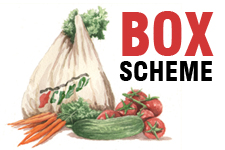In all our activities we practice, support and promote production and distribution systems that are sustainable, ecological, and non-exploitative.
For production methods, this means:
- working with natural processes to build soil life, fertility and structure as the basis for plant and human health;
- sustainable use of natural resources and minimum reliance on outside inputs;
- avoidance of chemical fertilisers and pesticides;
- maintenance of biodiversity and respect for wildlife;
- avoidance of genetically modified organisms.
We, and our suppliers and project partners, work according to one or more of the following documents, which provide more detailed accounts of how the above principles can be put into practice:
Organic Standards (Soil Association or other certifying body) for commercial food production
Wholesome Food Association Principles – for domestic-scale food growing and sales of surpluses
Garden Organic Guidelines for Organic Gardening – for domestic gardening and food growing
Additionally, we believe that current levels of consumption of meat and animal products is disastrous in terms of planetary and human health and animal rights/ welfare, and that a just and sustainable food system and diet can only be plant-based. Our growing site is certified Veganic, meaning all our produce grown at Hawkwood is free from any inputs derived from animals, at any stage in the process. We continue to work alongside friends in the Land Workers’ Alliance who are attempting a more compassionate and proportionate approach to animal farming, and hope to use our certification to engage the bourgening vegan community with the principles of food sovereignty. See http://veganorganic.net/ for more info on the Veganic farming standards.
For distribution systems, we believe:
- food should be consumed as close as practicable to where it is grown;
- the supply chain between producer, retailer and consumer should be as small as possible;
- food should be grown, distributed and processed by small-scale operations;
- the production, distribution and processing should safeguard decent rights, conditions and rewards for all workers, and ideally be democratically owned and controlled by the workers/ the community.
For other purchases we make, we also seek to keep the consumer-producer chain as short and direct as possible, and be aware of the environmental impacts of a product and its packaging (at all stages of production, sale, delivery and use). Our Purchasing Policy (revised November 2018) sets out how we seek to take these factors into consideration in making purchases.




